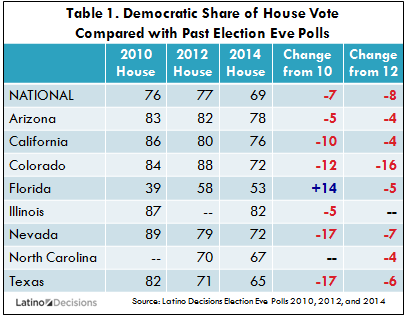The 2014 election has sent the Democratic Party back to the drawing board. The party looks to recover from an election that gave the Republican Party their greatest number of Congressional seats in nearly 70 years. It appears that Democrats understand that their 2016 strategy must include a focus on the Latino electorate, as House Minority Leader Pelosi recently named Congressman Ben Ray Lujan (New Mexico’s 3rd District) to head the Democratic Congressional Campaign Committee (DCCC).
Perceived by some as a surprise choice to lead the DCCC, Congressman Lujan is the first Latino to hold this important post charged with electing more Democrats to the House of Representatives. The decision to look to Latino leadership to turn things around in 2016 may have been a surprise, but was a very wise one. Democrats learned in 2014 that they cannot take the Latino electorate for granted.
Latino Decisions polling data (Table 1 below) shows that 2014 Democratic congressional candidates fared worse among Latino voters relative to those in recent elections. When we look at the aggregate Latino vote share for Congressional candidates over time, we see an 8 point decrease in 2014 compared to 2012, and 7 point decrease between the last off-year election in 2010 and 2014. In tight races this drop in support can mean the difference between winning and losing.

Matt Barreto recently illustrated that the salience of the Latino electorate to Congressional races is the result of an amazing increase in their share of the electorate across the country. He noted that from 2000 to 2012 the number of Latino registered voters at least doubled in a total of 28 states, at least tripling in 17. If this is not staggering enough, consider that 70,000 U.S. born Latino citizens turn 18 every single month, making them eligible to vote. With continued growth in the electorate among Latinos, the DCCC will lean on the relatively youthfulness of Lujan (42 years old) to mobilize these first time voters. Given that more (55%) Latino likely voters reported that they were not contacted by a campaign, party, or community organization in 2014 than were contacted, Lujan and the DCCC will easily improve on this dismal mobilization effort with even a modest increase in investment in this population.
Congressman Lujan has represented New Mexico’s 3rd district since 2009. His constituents in the state’s northern region include large Hispanic and Native American populations. Last month Lujan easily won re-election despite a heavy GOP surge across the state that resulted in a landslide victory for Republican Governor Susana Martinez, and the Republican Party gaining control of the New Mexico state legislature for the first time since 1953. The Republican Party triumph in New Mexico was primarily due to two factors: 1) terrible turnout among Democrats and 2) larger than average support from Hispanic voters supportive of their Latina incumbent Governor.
Lujan’s knowledge of how to successfully campaign in a tough environment will be very useful in 2016, particularly in the key battleground state just north of his district. Colorado is symbolic of the trends associated with Latino politics nationally, it has become highly competitive due largely to a growth in Latino population. Colorado’s Hispanic population has been highly supportive of Democratic candidates of late (as have Latinos nationally), particularly in 2012 when a whopping 88% of Latino voters indicated they voted for Democratic Congressional candidates. However, as Mark Udall can attest, while 2014 Democratic candidates did well among Latinos (72%), the drop of 16% among this important voting bloc from 2012 proved costly.
The Democrats hopes of improving outcomes in the key battleground state of Colorado (and the country more broadly) will rest in the capable hands of Congressman Lujan who is a rising star within the party. If he is successful we will undoubtedly see a rise in the number of Latinos elected to Congress from the record set in 2014, and greater consideration of Latino men and women for key posts like the head of the DCCC in years to come.
Gabriel R. Sanchez is Associate Professor of Political Science at the University of New Mexico and Research Director for Latino Decisions. He has published several articles focused on Hispanic political attitudes in New Mexico.


